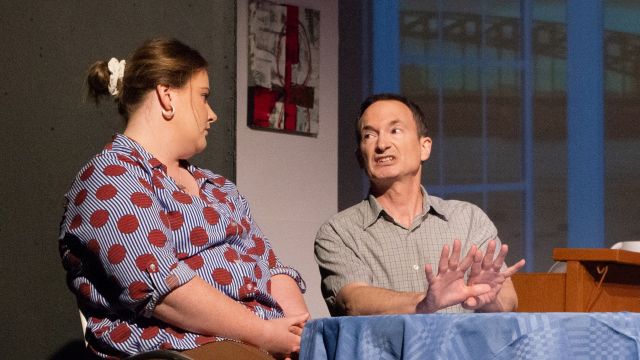Dinky-Di Double Bill – The Margarine Conspiracy and Down Came a Jumbuck
The fire was roaring in the foyer, the sherry was sipped in our seats, and all appeared back to normal at the Stirling Community Theatre. Returning after a Covid-enforced absence throughout most of the year, the Stirling Players presented a double bill of lesser-known Australian plays to an eager but distanced audience.
The evening began with The Margarine Conspiracy, a play from the 1980s that offers debate on environmental and social issues between three characters: schoolteacher Barbara, her brother Tom, and his girlfriend Helen. Barbara, played by Rebecca Gardner, has given up the fight on anything that needs a decision, unhappy in a steady job with a little money put aside. She tolerates her brother Tom (Andrew Aitken), a passionate man without a job, who researches in the State Library and engages with multiple conspiracy theories about the motivations for progress. His girlfriend Helen (Georgi Clough) seems to cling to his ideas only for his affection, and not because she believes any of them.

Director Bronwyn Chapple tried hard to delineate each scene, set either in Barbara’s Sydney flat or her car, but the unhappy trio meandered through the performance without any kind or resolution – or even real change. The constant breaching of the fourth wall made it more challenging to follow: are you talking to me? It wasn’t always clear what was part of the characters’ conversation and what was just being explained to us in the audience.
Aitken gave enough self-righteous anger to provoke the others (and us), but whilst the issues raised – single-use plastic, pollution, what’s really in our food – are still being discussed in similar terms today, they are much less controversial than thirty-five years ago, when this was first performed. Clough eeked some sympathy from the audience, torn between her and her boyfriend’s definitions of success; and Gardner showed us a more dynamic range of emotions with her alternating frustration, acceptance, and hope of someone else solving the problems.

After the interval, the set had changed from an urban apartment to a hundred-year old conference room, Down Came a Jumbuck being a one-act, light farce on the origins of the lyrics to ‘Waltzing Matilda’. The young assistant, Andy (nicknamed Banjo), had set out the table for an important meeting between an advertising agency boss and the creative director who had been asked to come up with a ‘jingle’ to stick in the minds of the Australian public. Of course, it was the suggestions from the intern that shaped the lyrics that would become the famous, alternative national anthem.

It’s all satire, of course, but the director (Chapple again) gave us fast-paced banter between the three characters that was strongly held up by the actors: Lochie Daniel showed us passion without cynicism in his portrayal of a young poet, and he held up his asides to the audience with more conviction than the first play. Maxine Grubel was great as Miss Church, the ‘arty’ creative director who adopted Banjo’s suggestions as her own; and Malcolm Walton’s Hubert had perfect comic-timing, both in his misunderstandings of what was being said, and in reminding us of the late-nineteenth century morality that made this dialogue even funnier.
The familiarity of the ballad meant that we had more than an inkling of what was coming next, but that had us waiting for the punchline – even the obvious ones earned a chuckle.
For both plays, the set design (also by Chapple) was simple: minimal furniture for a 1980s dinner or a 1890s business meeting, supported by a static projection to the rear cyc. Lighting design by Dale Evans was straightforward – and mostly, it didn’t need to be anything else.

Both plays were full of Australia: The Margarine Conspiracy poked a stick at our social and environmental issues; Down Came a Jumbuck made us look – with laughter and fondness – at the unusual words in a famous song. It was a welcome return for the Stirling Players, as well as for the community theatre building in the Adelaide Hills.
Mark Wickett
Subscribe to our E-Newsletter, buy our latest print edition or find a Performing Arts book at Book Nook.

